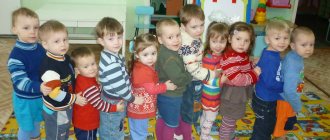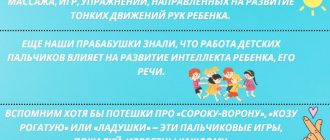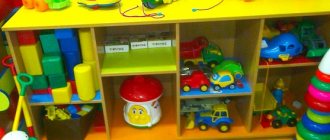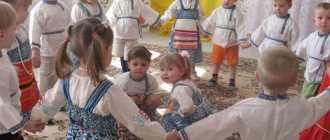Word games are a real salvation for parents. They can keep your child occupied in line, on the train, in the car, on the way to the metro... In short, when you need to pass the time, but there is nothing at hand. Or everything is there, but it has become boring.
Word games are very useful - they develop speech, memory, imagination, thinking, enrich vocabulary, and train phonemic hearing. And they're just fun to play! With the right word game, time flies.
This collection contains 14 games, arranged in increasing difficulty.
"I see something..."
The driver makes a wish for an object that is in the players’ field of vision: “I see something...” and names the color, shape, first letter of the word, etc. Players must guess the item.
The game is remarkable because it can be played with kids, making something very simple, and with older children. If you see that the child can cope easily, you can limit it to two or three attempts.
Example: “I see something green...” Players go through the options - a car, leaves on a tree, etc.
“I see something round...” (glasses on a person, road sign, traffic light, etc.)
“Who is screaming?”
Target. Ensure that children correctly reproduce various onomatopoeias. Development of the ability to onomatopoeia, as well as speech hearing.
Preparatory work. Prepare toys: rooster, chicken, cat, dog, duck, cow. Think through questions for the text of the poem so that children actively use onomatopoeia in their answers.
Ku-ka-re-ku! I look after the chickens.
Where, whack, whack! She got carried away in the bushes.
Moore - purrr! I scare the chickens.
Am-am! Who's there?
Quack-quack-quack! It will rain tomorrow morning!
Moo-moo! Milk for anyone?
Methodical instructions. You need to read the poem expressively, and while reading, show the children the appropriate toys.
4. "Words"
The first player says a word, the second player says a word starting with the last letter of the previous word.
Example: Shirt – Archaeologist – City – House, etc.
A more difficult option: come up with words starting with the last two letters of the previous word.
Example: TelnyashKA – KayuTA – Taxi – Syrup, etc.
Attention! In the complicated version, there may be words whose last two letters do not allow forming a word (for example, “foreigner”, “character”). If all players agree that a new word cannot be formed from the last two letters, then in this case the last letter is taken for word formation, as in the usual version of the game.
8. "Poker"
This fun word game is especially popular with kids. Ask the children to make a wish for any piece of furniture (chair, armchair, etc.) or kitchen utensil (fork, poker, rolling pin, etc.).
Then the driver asks the players various questions, which must be answered only with the hidden word.
Example: What is your name? - Poker.
What did you have for breakfast today? - Poker.
What gift did you receive for your birthday? - Poker.
Another version of the game: players think of words for each other, which they will then use to answer the driver.
Complication: You can't laugh.
Writing games
Encyclopedia
Not the fastest, but extremely exciting game for a company of four people - you will need pens, paper and some kind of encyclopedic dictionary (preferably not limited thematically - that is, the TSB will be better suited than the conventional “biological encyclopedia”). The presenter finds a word in the encyclopedia that is unknown to anyone present (here we can only rely on their honesty - but cheating in this game is uninteresting and unproductive). The task of each player is to write an encyclopedic definition of this word, coming up with its meaning out of their heads and, if possible, disguising the text as a real small encyclopedic article. Meanwhile, the presenter carefully rewrites the real definition from the encyclopedia. After this, the “articles” are mixed and read by the presenter in random order, including the present one, and the players vote for which option seems most convincing to them. Finally, the votes are counted and the points are distributed. Any player receives a point for correctly guessing the real definition and another point for each vote given by other participants to his own version. After this, the sheets are given back and a new word is played out - there should be about 6-10 of them in total. This game can also be played in teams: come up with imaginary definitions collectively. The game “poems” is structured in a similar way - but instead of a complex word, the presenter selects two lines from some little-known poem in advance and invites the participants to complete the quatrains.
Game from Inglourious Basterds
A game for a company of any size, which many knew before the Quentin Tarantino film, but it does not have a single name. Each player comes up with a role for his neighbor (usually it is some famous person), writes it on a piece of paper and sticks the piece of paper on his neighbor’s forehead: accordingly, everyone sees what role everyone has, but does not know who they themselves are. The participants’ task is to use leading questions, the answers to which are formulated as “yes” or “no” (“Am I a historical figure?”, “Am I a cultural figure?”, “Am I a famous athlete?”), to find out who exactly they are. In this form, however, the game exhausts itself quite quickly, so you can come up with completely different themes and, instead of famous people, play, for example, professions (including exotic ones - “carousel driver”, “taxidermist”), film and literary characters (you can mix them with real celebrities, but it’s better to agree on this in advance), in food (one player will be risotto, and the other, say, green cabbage soup) and even just in objects.
ABC Trim, alphabet enchanté. Illustrations by Bertal. France, 1861 Wikimedia Commons
Bulls and cows
A game for two: one participant thinks of a word, and it is agreed in advance how many letters it should contain (usually 4-5). The second's task is to guess this word by naming other four- or five-letter words; if some letters of the named word are in the hidden word, they are called cows, and if they have the same place inside the word, then they are bulls. Let’s imagine that the word “eccentric” is in your mind. If the guesser says “dot”, then he receives the answer from the second player: “three cows” (that is, the letters “ch”, “k” and “a”, which are in both “eccentric” and “dot”, but in different places). If he then says “cob”, he will no longer get three cows, but two cows and one bull - since the letter “a” in both “eccentric” and “cob” is in the fourth position. As a result, sooner or later they manage to guess the word, and the players can change places: now the first one will guess the word and count the bulls and cows, and the second one will name their options and track the extent to which they coincide with the guessed word. You can complicate the process by simultaneously guessing your word and guessing the opponent’s word.
Intelligence
A written game for a group (but can be played by two), consisting of three rounds, each lasting five minutes. In the first, players randomly type thirteen letters (for example, by blindly pointing a finger at a book page) and then make words from them, and only long ones - five letters or more. In the second round, you need to select a syllable and remember as many words as possible that begin with it; you can use words with the same root (for example, if the syllable “house” is chosen, then the words “house”, “domra”, “domana”, “domain” will do). “brownie”, “housewife”, etc.). Finally, in the third round the syllable is taken again, but now you need to remember not ordinary words, but the names of famous people of the past and present in which it appears, and not necessarily at the beginning - that is, both Karamzin and McCartney are suitable for the syllable “kar” , and, for example, Hamilcar. An important detail: since this con provokes the most controversy and cheating, the participants in the game can ask each other to prove that this person is really a celebrity, and here you need to remember at least your profession and country. Typical dialogue: “What, you don’t know Hamilcar? But this is a Carthaginian commander! After each round, points are calculated: if a particular word is the same for all players, it is simply crossed out, in other cases, players are awarded as many points for it as their opponents could not remember it. In the first round, you can also add points for particularly long words. Based on the results of the rounds, you need to determine who took first, second, third and other places, and at the end of the game these places are added up. The goal is to get the smallest number at the output (for example, if you were the winners of all three rounds, then you will get the number 3 - 1+1+1, and you are a champion; it cannot be less mathematically).
ABC Trim, alphabet enchanté. Illustrations by Bertal. France, 1861 Wikimedia Commons
Frame
A game for any number of people, which was invented by one of the creators of the chess program “Kaissa” and the author of the program for finding anagrams, Alexander Bitman. First, players choose several consonants - this will be the frame, the skeleton of the word. Then the time is noted (two to three minutes), and the players begin to “stretch” vowels (as well as “й”, “ь”, “ъ”) onto the frame to form existing words. Consonants can be used in any order, but only once, and vowels can be added in any number. For example, players choose the letters “t”, “m”, “n” - then the words “fog”, “manto”, “mantle”, “coin”, “darkness”, “ataman”, “muteness” and other. The winner is the one who can come up with the most words (as usual, these must be singular common nouns). The game can be played even with one letter - for example, “l”. The words “il”, “bark”, “yula”, “aloe”, “spruce” are formed around it, and if it is agreed that the letter can be doubled - “alley” and “lily”. If the standard “framework” has been mastered, then the task may be to compose an entire phrase with one consonant: a textbook example from the book by Evgeniy Gik - “Bobby, kill the boy and beat the woman at the baobab tree.”
Chain of words
A game for any number of players. Many people know it under the name “How to make a molehill out of a molehill,” and it was invented by the writer and mathematician Lewis Carroll, the author of “Alice.” The “chain” is based on metagram words, that is, words that differ in only one letter. The players' task is to turn one word into another with the least number of intermediate links. For example, let’s make a “goat” from a “fox”: FOX - LINDEN - PAW - KAPA - KARA - BARK - GOAT. It is interesting to give tasks with a plot: so that “day” turns into “night”, “river” becomes “sea”. The well-known chain, where the “elephant” grows from the “fly”, is obtained in 16 moves: FLY - MURA - TURA - TARA - KARA - KARE - CAFE - KAFR - MUSTER - SKAY - HOOK - ARINK - LESSON - DEADLINE - STOCK - MOAN - ELEPHANT (example by Evgeny Gik). To practice, you can compete in finding metagrams for a word. For example, the word “tone” gives “sleep”, “background”, “current”, “tom”, “tan” and so on - whoever gets the most options wins.
ABC Trim, alphabet enchanté. Illustrations by Bertal. France, 1861 Wikimedia Commons
Hat
A game for a company of four people, requiring simple equipment: pens, paper and a “hat” (an ordinary plastic bag will do). Sheets of paper need to be torn into small pieces and distributed to the players, the number of pieces depends on how many people are playing: the larger the company, the less for each person. Players write words on pieces of paper (one for each piece of paper) and throw them into the “hat”. Here, too, there are options - you can simply play with words (noun, common noun, singular), or you can play with famous people or literary characters. Then the participants are divided into teams - two or more people in each; Everyone’s task is to explain to their teammates in 20 seconds (or 30, or a minute - the timing can be set according to your own choice) the largest number of words randomly pulled out of the “hat”, without using the same roots. If the driver could not explain a word, it returns to the hat and will be played by the other team. At the end of the game, the words guessed by different representatives of the same team are summed up, their number is counted, and the team with the most pieces of paper is awarded the victory. A popular version of the game: everything is the same, but in the first round the players explain the words (or describe the characters) orally, in the second they show them in pantomime, in the third they explain the same words in one word. And recently a board game appeared, where you not only need to explain and show, but also draw.
“I’m going on a hike and taking with me...”
The driver says the first phrase: “I’m going on a hike and taking with me...” Then he adds any word that suits the meaning. The next player repeats the phrase and adds a word of his own.
The game continues until the players are able to repeat the entire phrase.
Example: “I’m going on a hike and taking with me... a bowler hat.”
“I go camping and take a bowler hat and matches with me.”
“I’m going on a hike and take a pot, matches and a knife with me,” etc.
By the way, the first phrase can be not only about the hike. For example: “I go to the store and buy there...”, “I go to visit and take with me...”, etc.
Word games for young children in kindergarten
Verbal games as a means of successful adaptation of young children to a preschool educational institution.
Author: Maria Borisovna Smirnova, teacher at MBDOU “Kindergarten No. 393 in Chelyabinsk.” Purpose: the article is intended for educators, parents of young children, to help with the adaptation of children to a preschool educational institution. Purpose: to reveal the importance of using word games in the adaptation of young children to the conditions of a preschool educational institution. Objectives: 1. Encourage teachers and parents to use word games for the successful adaptation of young children to a preschool educational institution. 2. Provide a selection of verbal games for adaptation: individual and subgroup. The transition of a young child from family education to a preschool educational institution is an important stage in the child’s development. This is a difficult process, both for the child and for his parents. In addition, this is a strong emotional experience for a child, so teachers and parents should make it as easy as possible for him to enter a new period. The child will have to enter completely different conditions than those to which he is accustomed in the family. Undoubtedly, a clear daily routine, observance of bedtime rituals, positive conversations will help the child adapt faster, but it is also necessary to use the main form of development of young children - play activity. The most important are individual games aimed at: 1) establishing tactile, trusting contacts with an adult; 2) mastering new types of gaming activities; 3) forming friendly contacts with other children. These games are played several times during the day; it is necessary to take into account the emotional state of the child at a specific moment of interaction. After establishing contacts with each child individually, you should move on to games with a subgroup, which have a number of features: 1) the game must begin with a surprise moment that allows you to interest the children and involve them in activities; 2) the game should include different types of activities so that children’s attention does not switch; 3) in the game, children must interact emotionally and express their emotions; 4) musical accompaniment is welcome to relieve emotional stress. When conducting games of any kind, the teacher must charge children with positive emotions, evoke a desire to take part in the game, and set examples of how to perform actions. We offer you a selection of word games for adaptation to preschool. Individual games for adaptation: 1. “My baby” Goals: establishing tactile contacts with the child; Relieving tension. The teacher hugs the baby, saying: You’re my little one, My pretty one... 2. “Jumping” Goals: establishing tactile contacts with the child; Relieving tension. The teacher hugs the baby, puts him in front of him and lifts him up, holding him by the armpits: Kushki - kushki, jumping, jumping, jumping, jumping! We got up on our feet, along the path, Jump-jump, jump-jump! 3. “Bayu - bayushki - bayu..” Goals: establishing tactile contacts with the child; Relieving tension. The teacher sits the child on his lap, gently presses him to himself and gently rocks him. I bayu - bayushki - bayu, Rest, my good one... Bayu - bayushki - bayu, You are with me - and I am with you... 4. “I’ll catch up, I’ll catch up, I’ll catch up!” Goals: establishing tactile contacts with the child; Relieving tension. The teacher organizes a game of catch-up: “I’ll catch up, I’ll catch up, I’ll catch up...”, then hugs the baby: “I’ve caught up!” How fast you are, how good you are!” 5. “Kuk-ku!” Goals: establishing positive emotional contacts between a child and an adult; relieving psycho-emotional stress. The child sits on the teacher’s lap, the teacher performs actions with the child’s hands: he closes and opens his face: Where is our baby? Cuckoo! Here he is our baby! The game is repeated several times. Adaptation games in the subgroup: 1. “Hello, doll Katya!” Goals: create a friendly emotional mood in the group, teach children to perform movements in accordance with the words and as shown by an adult. This is Katya doll! Let's wave our hand at her! Katya came to visit us, “Hello, Katya! How are you?" With the help of a doll, the teacher engages children in a variety of games. 2. “The bear came to visit us!” Goals: create a friendly emotional mood in the group, teach children to monitor their actions and reproduce them. The bear came to visit us! Top-top, top-top! And he knocks with his palms: Clap-clap, clap-clap! 3. “The bird has arrived!” Goals: create a friendly emotional mood in the group, develop coordination of movements. The bird has flown to us! Hello, little bird! You and I will fly too! We flap our wings, we fly far, we fly, we fly, we’ll fly to kindergarten! 4. “Toys” Goals: to create a friendly emotional mood in the group, to develop emotional communication between a child and an adult, and the ability to establish contact. Guys, look who came to us? These are toys! Let's see how beautiful they are! Choose a toy for yourself, stroke it... Now, let's play together, but first let our toys become friends! Let's help them say: “Hello!” 5. “What did the bunny bring us?” Goals: to create a friendly emotional mood in the group, to encourage children to have an emotional response and proactive speech. Guys, look who came to us? Bunny! What did he bring us in the basket? Let's take a look together! Apple, pear, banana, orange, grapes! Take a treat from the bunny and let's go cook him something to eat! Using individual and subgroup games to speed up the adaptation period, we help children make the transition to a new stage of development as painlessly as possible, overcome stress during the period of adaptation to kindergarten, relieve emotional stress, develop children’s interaction skills with the teacher and other children, and develop the ability to communicate through game actions.
We recommend watching:
Didactic games for the development of sensory abilities of children from 1 to 3 years old Didactic games for young children with their own hands Experience of interaction between a teacher and parents in solving educational problems. Early age group Game session on gender education for children of early age group
Similar articles:
Role-playing game in early preschool age
Games, songs, exercises for younger preschoolers “Igralochka”
Educational games for children 2-3 years old in kindergarten. Card index
Didactic game for children 2-3 years old “Let’s feed the doll lunch”
Games to develop attention in young children





